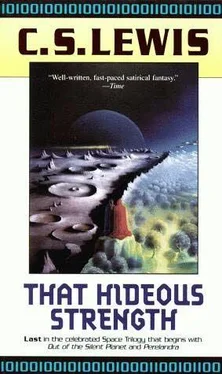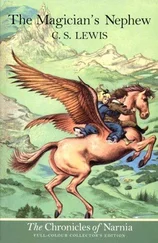Clive Lewis - That Hideous Strength
Здесь есть возможность читать онлайн «Clive Lewis - That Hideous Strength» — ознакомительный отрывок электронной книги совершенно бесплатно, а после прочтения отрывка купить полную версию. В некоторых случаях можно слушать аудио, скачать через торрент в формате fb2 и присутствует краткое содержание. Жанр: Религиоведение, Фэнтези, на английском языке. Описание произведения, (предисловие) а так же отзывы посетителей доступны на портале библиотеки ЛибКат.
- Название:That Hideous Strength
- Автор:
- Жанр:
- Год:неизвестен
- ISBN:нет данных
- Рейтинг книги:5 / 5. Голосов: 1
-
Избранное:Добавить в избранное
- Отзывы:
-
Ваша оценка:
- 100
- 1
- 2
- 3
- 4
- 5
That Hideous Strength: краткое содержание, описание и аннотация
Предлагаем к чтению аннотацию, описание, краткое содержание или предисловие (зависит от того, что написал сам автор книги «That Hideous Strength»). Если вы не нашли необходимую информацию о книге — напишите в комментариях, мы постараемся отыскать её.
That Hideous Strength — читать онлайн ознакомительный отрывок
Ниже представлен текст книги, разбитый по страницам. Система сохранения места последней прочитанной страницы, позволяет с удобством читать онлайн бесплатно книгу «That Hideous Strength», без необходимости каждый раз заново искать на чём Вы остановились. Поставьте закладку, и сможете в любой момент перейти на страницу, на которой закончили чтение.
Интервал:
Закладка:
Mark licked his lips and sat down.
“My reluctance to raise the question,” continued Wither, “would, however, be very much more serious if I did not feel able to assure you-in advance you understand-of the complete confidence which we all feel in you and which I very much hoped” (here for the first time he looked Mark in the eyes)” you were beginning to reciprocate. We regard ourselves here as being so many brothers and-er-sisters: so that whatever passes between us in this room can be regarded as confidential in the fullest possible sense of the word, and I take it we shall all feel entitled to discuss the subject I am about to mention in the most human and informal manner possible.”
Miss Hardcastle’s voice, suddenly breaking in, had an effect not wholly unlike that of a Pistol shot.
“You have lost your wallet, Studdock,” she said.
“My-my wallet?” said Mark.
“Yes. Wallet. Pocket-book. Thing you keep notes and letters in.”
“Yes. I have. Have you found it?”
“Does it contain three pounds ten, counterfoil of postal order for five shillings, letters from a woman signing herself Myrtle, from the Bursar of Bracton, from G. Hernshaw, F. A. Browne, M. Belcher, and a bill for a dress-suit from Simonds and Son, 32A Market Street, Edgestow?”
“Well, more or less so.”
“There it is,” said Miss Hardcastle pointing to the table. “No you don’t!” she added as Mark made a step towards it.
“What on earth is all this about?” said Mark. His tone was that which I think almost any man would have used in the circumstances but which policemen are apt to describe as “blustering.”
“None of that,” said Miss Hardcastle. “This wallet was found in the grass beside the road about five yards away from Hingest’s body.”
“My God!” said Studdock. “You don’t mean . . . the thing’s absurd.”
“There’s no use appealing to me,” said Miss Hardcastle. “I’m not a solicitor, nor a jury, nor a judge. I’m only a policewoman. I’m telling you the facts.”
“Do I understand that I’m suspected of murdering Hingest?”
“I don’t really think,” said the Deputy Director, “that you need have the slightest apprehension that there is, at this stage, any radical difference between your colleagues and yourself as to the light in which this very painful matter should be regarded. The question is really a constitutional one “
“Constitutional?” said Mark angrily. “If I understand her, Miss Hardcastle is accusing me of murder.”
Wither’s eyes looked at him as if from an infinite distance.
“Oh,” said he, “I don’t really think that does justice to Miss Hardcastle’s position. That element in the Institute which she represents would be strictly ultra vires in doing anything of the kind within the N.I.C.E.-supposing, but purely of course for purposes or argument, that they wished, or should wish at a later stage, to do so-while in relation to the outside authorities their function, however we define it, would be quite inconsistent with any action of the sort; at least in the sense in which I understand you to be using the words.”
“But it’s the outside authorities with whom I’m concerned, I suppose,” said Mark. His mouth had become dry and he had difficulty in making himself audible. “As far as I can understand, Miss Hardcastle means I’m going to be arrested.”
“On the contrary,” said Wither. “This is precisely one of those cases in which you see the enormous value of possessing our own executive. Here is a matter which might, I fear, cause you very considerable inconvenience if the ordinary police had discovered the wallet or if we were in the position of an ordinary citizen who felt it his duty-as we should ourselves feel it our duty if we ever came to be in that very different situation-to hand over the wallet to them. I do not know if Miss Hardcastle has made it perfectly clear to you that it was her officers, and they only, who have made this-er-embarrassing discovery.”
“What on earth do you mean?” said Mark. “If Miss Hardcastle does not think there’s a prima facie case against me, why am I being arraigned in this way at all? And if she does, how can she avoid informing the authorities?”
“My dear friend,” said Wither in an antediluvian tone “there is not the slightest desire on the part of the Committee to insist on defining, in cases of this sort, the powers of action of our own police, much less, what is here in question, their powers of inaction. I do not think any one had suggested that Miss Hardcastle should be obliged in any sense that limited her own initiative-to communicate to outside authorities, who by their very organisation must be supposed to be less adapted for dealing with such imponderable and quasi-technical inquiries as will often arise, any facts acquired by her and her staff in the coudre of their internal functioning within the N.I.C.E.”
“Do I understand,” said Mark, “that Miss Hardcastle thinks she has facts justifying my arrest for the murder of Mr. Hingest, but is kindly offering to suppress them?”
“You got it now, Studdock,” said the Fairy. A moment later, for the first time in Mark’s experience, she actually lit her cheroot, blew a cloud of smoke, and smiled, or at least drew back her lips so that the teeth became visible.
“But that’s not what I want,” said Mark. This was not quite true. The idea of having the thing hushed up in any way and on almost any terms when it first presented itself a few seconds ago had come like air to one suffocating. But something like citizenship was still alive in him and he proceeded, almost without noticing this emotion, to follow a different line. “I don’t want that,” he said, speaking rather too loud, “I’m an innocent man. I think I’d better go to the police-the real police, I mean-at once.”
“If you want to be tried for your life,” said the Fairy, “that’s another matter.”
“I want to be vindicated,” said Mark. “The charge would fall to pieces at once. There was no conceivable motive. And I have an alibi. Everyone knows I slept here that night.”
“Really?” said the Fairy.
“What do you mean?” said Mark.
“There’s always a motive, you know,” said she, “for anyone murdering anyone. The police are only human. When the machinery’s started they naturally want a conviction.”
Mark assured himself he was not frightened. If only Wither didn’t keep all his windows shut and then have a roaring fire!
“There’s a letter you wrote,” said the Fairy.
“What letter?”
“A letter to a Mr. Pelham, of your own College, dated six weeks ago, in which you say, ‘ I wish Bill the Blizzard could be moved to a better world.’”
Like a sharp physical pain the memory of that scribbled note came back to Mark. It was the sort of silly jocularity one used in the Progressive Element-the kind of thing that might be said a dozen times a day in Bracton about an opponent or even about a bore.
“How does that letter come to be in your hands?” said Mark.
“I think, Mr. Studdock,” said the Deputy Director, “it would be very improper to suggest that Miss Hardcastle should give any kind of exposition-in detail, I mean-of the actual working of the Institutional Police. In saying this I do not mean for one moment to deny that the fullest possible confidence between all the members of the N.I.C.E. is one of the most valuable characteristics it can have, and, indeed, a sine qua non of that really concrete and organic life which we expect it to develop. But there are necessarily certain spheres-not sharply defined, of course, but inevitably revealing themselves in response to the environment and obedience to the indwelling ethos or dialectic of the whole-in which a confidence that involved the verbal interchange of facts would-er-would defeat its own end.”
Читать дальшеИнтервал:
Закладка:
Похожие книги на «That Hideous Strength»
Представляем Вашему вниманию похожие книги на «That Hideous Strength» списком для выбора. Мы отобрали схожую по названию и смыслу литературу в надежде предоставить читателям больше вариантов отыскать новые, интересные, ещё непрочитанные произведения.
Обсуждение, отзывы о книге «That Hideous Strength» и просто собственные мнения читателей. Оставьте ваши комментарии, напишите, что Вы думаете о произведении, его смысле или главных героях. Укажите что конкретно понравилось, а что нет, и почему Вы так считаете.












